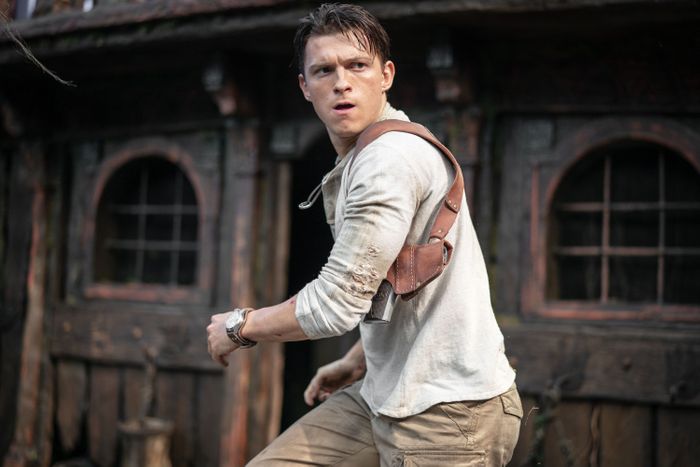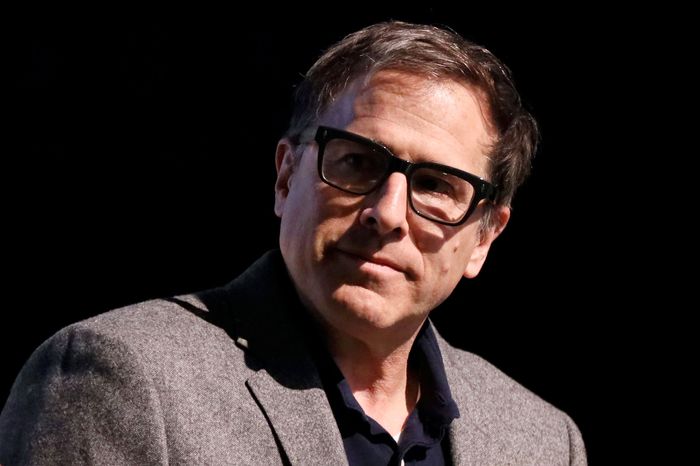
Over its 14-year journey to the big screen, the action-thriller Uncharted has careened across the Hollywood talent map from filmmaker to filmmaker, from star to star — and in defiance of its source material, even from genre to genre. Sony’s $120 million adaptation of its own blockbuster PlayStation video-game series of the same name stars Tom Holland as a treasure-hunting adventurer named Nathan Drake and was directed by Ruben Fleischer (Venom); a kind of bubblegum synthesis of Lara Croft, Dan Brown’s Robert Langdon novels, Nic Cage’s National Treasure, Pirates of the Caribbean, and Raiders of the Lost Ark. But as we know from the WikiLeaks dump of internal Sony emails, nearly a decade earlier, studio executives had their eyes set on Adam McKay, Paul Greengrass, Daniel Espinoza, or Todd Phillips for the directing job (none of them accepted). At one point Red Notice filmmaker Rawson Marshall Thurber and Seth Gordon (Baywatch, Horrible Bosses) were in a “bake off” to land the Uncharted gig. Oscar Isaac, Jamie Dornan, Aaron Taylor-Johnson, Travis Fimmel, Chris Hemsworth, and Chris Pratt were vetted for the leading role when original star Mark Wahlberg’s commitment appeared less than solid. And it is a matter of public record that directors including David O. Russell, Shawn Levy, Dan Trachtenberg, Neil Burger, and Travis Knight all boarded and departed the project before Fleischer came to occupy the director’s chair.
One of those filmmakers, however, is not like the others. Thanks to such awards-benighted and commercially successful titles as Silver Linings Playbook and 2013’s American Hustle, writer-director Russell now ranks among the top tier of American auteurs. Thrice nominated for a Best Director Academy Award (with two other Oscar nods for Best Adapted Screenplay for Silver Linings and Best Original Screenplay for American Hustle also to his credit), he’s considered an actor’s director and dramatic hyperstylist, probably the last person even a casual industry observer would expect to helm a pulpy, by-the-numbers Indiana Jones knockoff like Uncharted in which characters dangle from planes, dodge poison arrows, and conduct aerial pirate-ship battles.
But back in 2010, Russell had yet to break through. Regarded as brilliant but mercurial, the director reportedly headbutted and throat-grabbed George Clooney on the set of his 1999 war-heist drama Three Kings. And in a viral video shot in 2004 during filming on Russell’s existential comedy I Heart Huckabees, the director can be seen flying into an epic freak out on cast member Lily Tomlin. “Fuck you!” he screams at the actress before kicking a pile of papers off a desk. “I worked on this thing for three fucking years, and I’m not going to have some fuckin’ cunt yell at me in front of the fucking crew when I’m trying to fucking help you. Bitch!”
Russell’s acclaimed biopic The Fighter would not receive a theatrical release until the final weeks of 2010 (before going on to land seven Oscar nominations), and he was on something of a cold streak after the floppage of Huckabees. Moreover, Russell had been flirting with directing genre fare, such as the literary-horror mash-up Pride and Prejudice and Zombies, when Sony announced his Uncharted hire. Wahlberg informed MTV of the director’s intention to bring on Goodfellas castmates Robert De Niro and Joe Pesci to play his character’s father and uncle, respectively — family members who notably do not appear anywhere in the video games. “I’m obviously into whatever David wants to do, but the idea of it is so off the charts,” Wahlberg said, with no apparent pun intended. “De Niro being my father, Pesci being my uncle. It’s not going to be the watered-down version, that’s for sure.”
According to a source with intimate knowledge of Uncharted’s development process (who spoke to Vulture anonymously because of ongoing business sensitivities), the idea was in fact to have De Niro portray Drake’s father figure and mentor Victor “Sully” Sullivan — ironically, the character Wahlberg ended up playing in the finished film a dozen years after aging out of the lead role. “David was like, ‘Look, I love Wahlberg, and I want to cast De Niro to play Sully; I think they’d be great together,” the person says. “And Russell kind of was saying — although he didn’t say it — he’s like, ‘I want to do a mob movie.’ I inferred that from the De Niro idea and some plot points he had about how the looted goods would be fenced and who the bad guys were. The casting impulses he had indicated that’s what it was going to feel like.”
Various chapters of the Uncharted game series play out in the Amazon rainforest, the Arabian desert, a chateau in France, and the Tibetan Plateau. And in them, Drake is tasked with evading foes, swinging from ropes, climbing along ledges, and engaging in all manner of combat. La Cosa Nostra and the whole “fuhgeddaboudit” filmic milieu associated with Pesci and De Niro do not factor into the action being translated for the multiplex. “It was like, Wait a second. So we have a script we kind of like. David wants to redevelop it. He’s a bit of a wild man. He wants to do a bit of a mob movie,” our source says. “We don’t have to be overly faithful to the video game. But we don’t want to alienate the gamers. And that’s not who Nathan Drake and Sully are in the game at all. It feels super dangerous. So basically it was like, ‘No, we don’t want to do that.’”
A spokesperson for Russell said the director was unavailable to comment for this story. One of Uncharted’s producers, Charles Roven, disputes the characterization that Russell was teeing up anything mafia-related. “It was about a family involved in antiquities, not a mob, and we parted ways amicably over creative differences,” Roven said in an email to Vulture.
Russell lasted less than six weeks on the project before producers and studio executives bounced him. But that dismissal ultimately proved to be a blessing in disguise. Had the director succeeded in bringing his version of Uncharted to the screen, he would have likely continued on in a B-movie vein: a side effect of Hollywood’s pronounced tendency to pigeonhole filmmakers by genre niche more than directorial vision. Instead, Russell threw his energy into Silver Linings Playbook (reportedly rewriting the script more than 20 times), which rocketed him onto the A-list of directors, and later reunited with Roven, who also produced American Hustle, in 2013. “It worked out well for him,” our source says.



